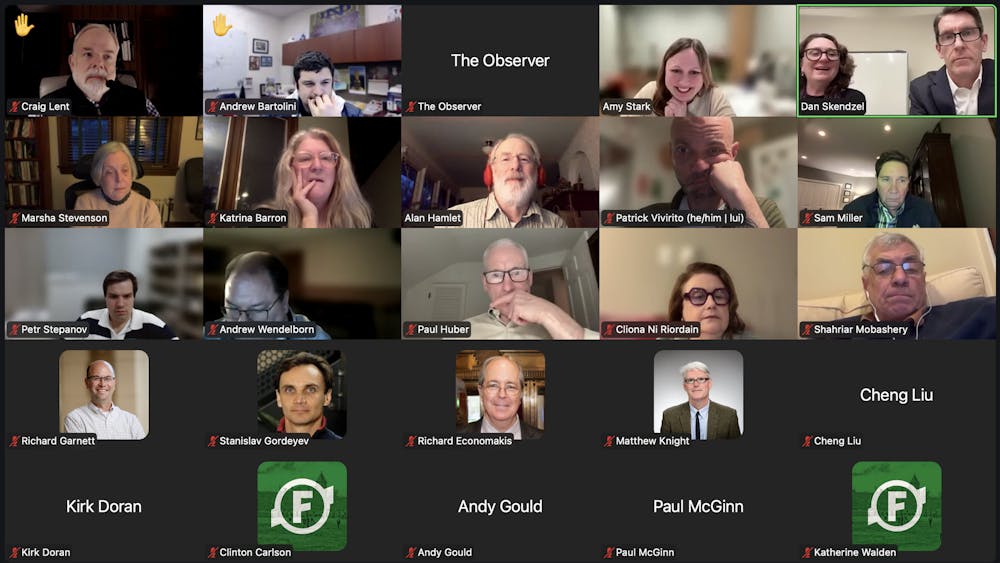A new book shedding light on parts of University President Emeritus Fr. Theodore Hesburgh's life that were previously unknown was published March 12. Written by Notre Dame professor of history Rev. Wilson D. Miscamble, "American Priest: The Ambitious Life and Conflicted Legacy of Notre Dame’s Father Ted Hesburgh," explores the many roles and contributions of Hesburgh.
His contributions range from higher education, to the civil rights movement and to his work as an advisor to popes and presidents. A Notre Dame faculty member since 1988, Miscamble said he wrote the book in order to gain a better understanding of Notre Dame’s evolution under Hesburgh’s influence.
“It was both a desire to understand the Notre Dame story and also to track something of these amazing involvements he had beyond Notre Dame,” Miscamble said. “I was curious about how Notre Dame had developed and evolved, and I thought a good way to understand that story would be to study the person who had led it for such a long period of time.”
Additionally, as a specialist in American foreign policy since World War II and the role of Catholics in 20th-century U.S. foreign relations and public life, Miscamble said he was excited by the opportunity to write about Hesburgh’s rich and extensive history.
“I knew that Fr. Ted had been involved in so many activities beyond Notre Dame in American public life and in the life of the Catholic Church, so I knew it would be an interesting story to track him. To follow his life would allow me to look at his involvement in the whole range of issues — from the presidency of Dwight Eisenhower all the way up to to Bill Clinton's — and to his connections to the various popes from Pius XII through to John Paul II,” Miscamble said.
Miscamble said he had been planning to write Hesburgh’s biography for quite some time. However, when he initially sat down with Fr. Hesburgh to discuss writing the biography, Miscamble said Hesburgh had misgivings.
“At the outset Hesburgh demanded, ‘How could any single person, let alone a busy one like me, investigate with care the records of the various commissions and agencies on which he served,” Miscamble said in the preface of his book.
Over time and many meetings with Hesburgh, however, Miscamble said he slowly accumulated the stories necessary for his work. Miscamble admitted it took an incredible amount of perseverance and work.
“It was a matter of gathering my research, doing all of the hard work of research and then sitting down and having to write up a story. You've got to put yourself in your chair and go to work,” Miscamble said.
One of the many benefits of Miscamble’s work is it uncovered some things which Miscamble said he had not previously known about Hesburgh. Hesburgh’s relationships with the Kennedy’s and Lyndon Johnson, for example, were not what Miscamble had anticipated.
“You might think, ‘oh the first Catholic president, Father Ted would be enthusiastic etc.’ But he [Hesburgh] found that the Kennedys were not as supportive on civil rights as he had hoped and that there was some friction there... he had a great affection for Lyndon Johnson because he believed LBJ had actually pushed hard on civil rights and got the 1964 and 1965 legislation through,” Miscamble said. “And second, looking more at the internal operations of Notre Dame, were the challenges he felt in the late 1960s trying to maintain order on the campus. The extent of that and how it weighed on him surprised me a bit.”
When asked whether some might have a negative reaction to his book, Miscamble acknowledged that a mixed reception was possible.
“I've tried to write a serious book and an honest book, and my book is not a hagiography. I am trying to look at the strengths but also the limitations of Fr. Hesburgh and to weigh him as a real person not as an icon. I would think some folks might have reservations about that so I'm curious to find out what the reaction will be,” Miscamble said. “I'm excited now to get the book out and to hopefully have it discussed and for it to be something that stimulates further discussion.”
Miscamble said this discussion is important to him as a Catholic professor of history, and he recognizes the importance of reflection and discussion of the past.
“I think far too many people operate just in a present moment without having a good understanding of how things came to be as they are,” he said. “I believe history can provide us with a certain perspective and wisdom to address our contemporary circumstances, so I do hope students will pick up this book and realize something of how Notre Dame came to be the place that it is today — with its strengths, but also its limitations.”
Read More
Trending








